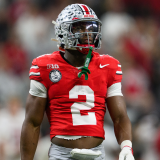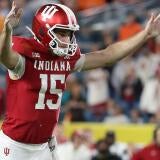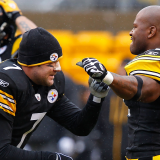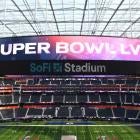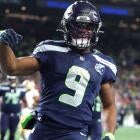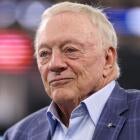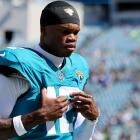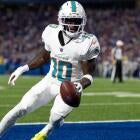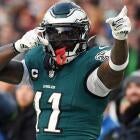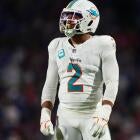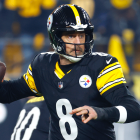Super Bowl 2022 cheat sheet for casual fans: Everything you need to know about Rams and Bengals at your party
Everything you need to know to talk about Super Bowl LVI at a party

If you're a huge football fan, I don't have to tell you that the Los Angeles Rams and Cincinnati Bengals are a few hours away from battling it out in Super Bowl LVI for the right to call themselves champions of the 2021 NFL season. But what if you aren't really that into the NFL? What if, say, the only things you know about rams and bengals are that they're actually sheep and tigers? What if the extent of your annual engagement with the Super Bowl is going to a party and trying to think of things to contribute to the conversation between commercials?
In this case, we've got you covered. This is the fifth annual casual fan's guide to the Super Bowl.
Who's playing in Super Bowl LVI? And why is it called Super Bowl LVI?
First and foremost, it's important to know everything about the participants in the NFL's title game. Representing the NFC, we have the Los Angeles Rams. They're favored by 4 points as of this writing. That means betting experts at Caesars Sportsbook think this is going to be a close game, but that the Rams are the slightly better team. Representing the AFC, meanwhile, are the Cincinnati Bengals. The two teams can be told apart by their respective color schemes. The Rams wear blue, gold, and white uniforms, while the Bengals are in orange, black, and white.
It's called Super Bowl LVI because it's the 56th Super Bowl, and 56 in Roman numerals is LVI. The NFL has been using Roman numerals for every Super Bowl (except Super Bowl 50) since Super Bowl V (five). According to the NFL's media guide, "The Roman numerals were adopted to clarify any confusion that may occur because the NFL Championship Game -- the Super Bowl -- is played in the year following a chronologically recorded season. Numerals I through IV were added later for the first four Super Bowls."
What time is the Super Bowl? Where is it?
The Super Bowl starts at 6:30 p.m. ET on Sunday, Feb. 13, 2022. The game will be played in the home stadium of the Rams, SoFi Stadium in Inglewood, California. The NFL rotates the location of the Super Bowl every year because it generally wants to provide a neutral site so no team has home-field advantage. That had previously worked every year up until last year, when the Buccaneers won the Super Bowl in their home stadium. Now, the Rams have a chance to make it two in a row.
And how long is it going to last?
As our Cody Benjamin noted a few years back, the average Super Bowl broadcast over the past 20 years or so has been about three-and-a-half hours. It's pretty long. That includes a halftime show that generally lasts 20 to 30 minutes.
Who's performing at halftime?
It's a heck of a show this year, folks. Congratulations to anyone who grew up in the 1990s and 2000s because this show was basically built for you: It's Dr. Dre, Snoop Dogg, Eminem, Kendrick Lamar, and Mary J. Blige. That's ... [checks notes] ... 43 Grammy wins on one stage at the same time, in case you're wondering.
Who are the quarterbacks of the Rams and Bengals?
It's always a good bet that the quarterbacks will play a big role in the Super Bowl. A quarterback usually wins MVP of the game, after all. A quarterback has won 31 of the previous 55 Super Bowl MVP trophies, and 14 of the last 21 since 2000.
The quarterback of the Rams is Matthew Stafford (No. 9). This is Stafford's first year with the Rams. He spent the previous 12 seasons of his career with the Detroit Lions, who made him the No. 1 overall pick in the 2009 NFL Draft. During that time, Stafford was widely considered a good quarterback stuck languishing on a bad team. The Lions' decision to embark on a rebuild matched up with the Rams' desire to upgrade over former quarterback Jared Goff, and the two teams agreed last offseason on a trade sending Goff, two first-round picks, and a third-round pick to Detroit in exchange for Stafford.
He played well during his first season in Los Angeles, throwing for 4,886 yards and a career-high-tying 41 touchdowns. His arm strength and willingness to throw with anticipation led to an expansion of Los Angeles' offense, which had grown a bit stale under his predecessor. His partnership with wide receiver Cooper Kupp (more on him below) led to one of the most. productive pass-catching seasons in NFL history. Stafford was a bit inconsistent throughout this season, though, and led the league with 17 interceptions.
The quarterback of the Bengals is Joe Burrow (No. 9). The Bengals selected Burrow with the No. 1 overall pick in the 2020 NFL Draft after he had come seemingly out of nowhere to put together one of the greatest college seasons of all time, which culminated in a national championship for LSU. He immediately solidified the Bengals' offense upon his arrival and was in the midst of a strong rookie season when he tore his ACL during the team's 10th game of the year. (Burrow's ACL surgery was done by Dr. Neal ElAttrache, who also happens to be the Rams' team doctor.)
Burrow rehabbed his knee injury and was ready to resume his place as the team's starter by the beginning of the 2021 campaign. He got off to a bit of a slow start as the team eased its way back into a pass-heavy offense throughout the year, but ultimately had a season that is likely to garner him significant support in the race for Comeback Player of the Year. Burrow led the NFL in both completion percentage and yards per attempt despite being sacked a league-high 51 times, and he threw 34 touchdown passes against 14 interceptions. By making the Super Bowl in just his second NFL season, he became the first No. 1 overall pick quarterback to lead his team to a conference championship victory in either of his first two years in the league.
With Stafford and Burrow meeting each other in this game, this will be just the second time in league history that two quarterbacks taken with the No. 1 pick will square off in a Super Bowl. The first time it happened was in Super Bowl 50, when Peyton Manning's Denver Broncos took on Cam Newton's Carolina Panthers.
Are there any other notable players I should be prepared to talk about?
Of course!
Let's start with the Rams:
- Defensive lineman Aaron Donald (No. 99). He is arguably the best player in all of football. Donald is a defensive tackle, which is a position where most players fill a limited role as either a run-stopper or interior pass-rusher, but Donald is the best in the league at both of those things. He has been in the NFL for eight seasons and has made the Pro Bowl eight times and the All-Pro First Team seven times (including this season). Donald has won Defensive Player of the Year three times and has never finished outside the top five in DPOY voting. Given the relative weakness of the Bengals' offensive line, there is a distinct possibility that Donald can wreck their entire game plan by himself.
- Wide receiver Cooper Kupp (No. 10). A former third-round pick out of Eastern Washington, Kupp was the best wide receiver in football this season, and even garnered some support in the MVP conversation. He finished the regular season with 145 catches (second-most all time) for 1,947 yards and 16 touchdowns, leading the league in all three categories. By racking up 100 or more receiving yards in each of L.A.'s last two games, Kupp tied former Dallas Cowboys wide receiver Michael Irvin for the most 100-yard games in a single season (playoffs included). During the Jared Goff era, Kupp mostly got by on catching short passes in the area close to the line of scrimmage. With Stafford on board, he expanded his role to become much more of a downfield threat, taking the Rams offense to a whole new level in the process.
- Defensive back Jalen Ramsey (No. 5). Ramsey is considered arguably the best cornerback in the NFL. He was acquired from the Jacksonville Jaguars in exchange for two first-round picks and a fourth-round pick back in 2019, and he has been named a First Team All-Pro in each of his full seasons with Los Angeles. This season, Ramsey's role changed a bit under new Rams defensive coordinator Raheem Morris (more on him below), who deployed Ramsey in the slot more often than in the past. That allowed him to play closer to the ball and get involved in the run game more often, and injected more unpredictability into the Rams' defensive fronts.
- Wide receivers Odell Beckham Jr. (No. 3) and Van Jefferson (No. 12). Beckham was traded to the Rams midseason after a high-profile fallout with the Cleveland Browns. He became a star during his time with the New York Giants and was a bold acquisition for Cleveland, but things never worked out for him there. He played a small role upon his initial arrival in L.A., but has emerged during the playoff run as an integral weapon, catching 19 passes for 236 yards and a touchdown through the Rams' first three games. Jefferson is the team's No. 3 wide receiver, largely operating as a deep threat. If Stafford throws a long touchdown pass, there's a pretty good chance that Jefferson will be on the receiving end of it.
- Edge rushers Von Miller (No. 40) and Leonard Floyd (No. 54). Miller is a future Hall of Fame edge rusher who was acquired at the trade deadline from the Denver Broncos. He has 115.5 sacks in his NFL career despite missing 1.5 seasons due to injury, He is an eight-time Pro Bowler and three-time First Team All-Pro and was also named MVP of Super Bowl 50 during his time with Denver. Floyd is a former first-round pick of the Chicago Bears, who was a bit of a disappointing player during his time there. Since arriving in L.A., though, Floyd has been a much more effective player. He 20 sacks during his two years with the Rams, compared with 18.5 during four years in Chicago.
- Safety Eric Weddle (No. 20). The 37-year-old Weddle was actually retired until three weeks ago. A six-time Pro Bowler and two-time All-Pro during his career with the Chargers, Ravens, and Rams, Weddle called it quits following the 2019 season. But when the Rams lost both of their starting safeties to injury before the playoffs, they called Weddle. He played sparingly in his first game back, but ratcheted up to 100 percent of the snaps in the NFC title game. It's a pretty incredible story.
- Left tackle Andrew Whitworth (No. 77). Speaking of incredible stories... Whitworth is 40 years old and in his 16th NFL season. He spent the first 11 years of his career with the Bengals, playing and starting 168 of 176 possible games and making three Pro Bowls along the way. Cincinnati made the playoffs six times in his 11 years, but lost in the first round each time. He signed with the Rams prior to the 2017 season and has been their starting left tackle ever since. Now, he gets to face his former team in the Super Bowl.
- Running backs Cam Akers (No. 23) and Sony Michel (No. 25). Akers tore his Achilles in July, yet made it back in time for the end of the regular season. He has recently resumed his place as the team's starter and bell-cow in the backfield, though he has not been particularly effective yet. Michel began the season as the backup to Darrell Henderson (No. 27) but eventually took over the lead role. He has been more effective than Akers during the postseason run, despite seeing his playing time cut. Henderson has missed the last few games while on injured reserve, but is eligible to play in the Super Bowl.
And what about the Bengals?
- Wide receivers Ja'Marr Chase (No. 1), Tee Higgins (No. 85), and Tyler Boyd (No. 83). This trio of players gives the Bengals one of the league's best pass-catching corps. Chase, the No. 5 overall pick in the 2021 NFL Draft, was Burrow's teammate at LSU. The pair's chemistry with friendship played a significant role in the Bengals choosing Chase with that pick. He had a fantastic rookie season, catching 81 passes for a rookie-record 1,455 yards and 13 touchdowns. He was named Offensive Rookie of the Year, as well as a Pro Bowler and Second Team All-Pro. Higgins was Cincinnati's second-round pick in the 2020 NFL Draft, and he is considered a prototypical "X" receiver, which means he often aligns on the perimeter and draws coverage from the opposing team's best outside cornerback. He finished the season with 74 catches for 1,094 yards and six touchdowns despite playing in only 14 of 17 games. The veteran in Cincinnati's receiver room, Boyd is a slot receiver who mostly catches short passes over the middle of the field to help move the chains when Burrow does not have time to fire the ball deep to one of the more explosive targets.
- Defensive ends Trey Hendrickson (No. 91) and Sam Hubbard (No. 94). Hendrickson signed a big-money free-agent deal with the Bengals last offseason after a breakout season with the New Orleans Saints. He followed up his 13.5-sack 2020 season with a 14-sack year in 2021, and finished fourth in the NFL in total pressures. Hubbard plays across the line of scrimmage from Hendrickson, and finished this season with 7.5 sacks. He made two of the biggest plays of the AFC title game, sacking Patrick Mahomes on back-to-back plays late in the fourth quarter and helping send the game to overtime, where the Bengals ultimately won.
- Running back Joe Mixon (No. 28). Mixon was a top running back prospect during his collegiate career and has been a solid starter in the NFL. His role has been reduced a bit during the Burrow era as the team has utilized pass-catching running backs to spell him on occasion.
- Safety Jessie Bates III (No. 30). Bates is a fourth-year safety who has become a star over the last two years. He's considered one of the biggest snubs from the Pro Bowl and All-Pro teams. He made one of the biggest plays of the AFC Championship game, knocking a Patrick Mahomes pass out of the air and into the arms of teammate Vonn Bell. Given the Rams' propensity for throwing deep down the field, Bates is sure to play an important role in the Super Bowl.
- Offensive linemen Jonah Williams (No. 73), Quinton Spain (No. 67), Trey Hopkins (No. 66), Hakeem Adeniji (No. 77), and Isaiah Prince (No. 75). The Bengals' widely-criticized offensive line allowed the most sacks in the NFL this season, and yielded a ton of pressure on Burrow. Cincinnati famously passed on picking an offensive lineman at No. 5 overall in order to reunite Burrow and Chase, which worked out quite well. This group is likely overmatched against the Rams' defensive line, but it was also overmatched against the Raiders, Titans, and Chiefs, and the Bengals still won each of those games to advance to the Super Bowl.
- Cornerbacks Mike Hilton (No. 21), Eli Apple (No. 20), and Chidobe Awuzie (No. 22). Hilton is the Bengals' slot corner, which makes him a very important player in this game as he was draw the majority of the coverage responsibility on Kupp. He's a very good slot corner, but Kupp is arguably the toughest player in the league to cover. Apple and Awuzie have played far better than expected in Cincinnati, surpassing their performance from earlier in their careers. They will likely spend most of their time defending Beckham and Jefferson on the outside.
There are obviously more notable players, but this list is a good start.
Who are the coaches of the Rams and Bengals?
The head coach of the Rams is Sean McVay. At the time he was hired, McVay was the youngest head coach in modern NFL history. He has been L.A.'s head coach for five seasons, and he is still the youngest head coach in the league. (McVay just turned 36 years old.) He is widely considered one of the best offensive designers and play-callers in the NFL, and has already spawned a rather large coaching tree for someone as young as he is. There was a time just a few years ago where seemingly half the league was trying to find "the next Sean McVay," and many teams around the league have simply settled on hiring one of his assistants.
One of McVay's former assistants is Bengals head coach Zac Taylor. He served as a wide receivers coach and then quarterbacks coach under McVay in L.A., before he was named as the successor to longtime Bengals coach Marvin Lewis. The team was dreadful during Taylor's first two seasons, going just 6-25-1, but turned things around this year thanks to the combination of Burrow and Chase, along with their offseason acquisitions that helped rebuild the defense.
The Rams and Bengals also both have several well-known assistant coaches, each of whom has been considered a candidate for available head-coaching jobs this offseason.
The Rams' offensive coordinator is Kevin O'Connell. A former NFL backup quarterback, O'Connell is the latest in a line of McVay's underlings to be considered a future head coach and it is expected that the Vikings will hire him. In addition to Taylor, Green Bay Packers coach Matt LaFleur and Los Angeles Chargers coach Brandon Staley are former McVay coordinators. Packers defensive coordinator Joe Barry and Seattle Seahawks offensive coordinator Shane Waldron are also former McVay assistants, having worked as position coaches in L.A. O'Connell is expected to become the next head coach of the Minnesota Vikings, though his hiring cannot be made official until after the Super Bowl.
L.A.'s defensive coordinator is Raheem Morris. The former head coach of the Tampa Bay Buccaneers, this was actually Morris' first season as a full-time defensive coordinator, though he has been a top assistant in several stops. He incorporated most of the scheme used by his predecessor (Staley), though did incorporate some tweaks to make it his own. As previously mentioned, Morris deployed the versatile Ramsey in the slot more often; and his game plan against the 49ers in the NFC title game helped the Rams snap a six-game losing streak to their division rivals. Morris has interviewed with the Minnesota Vikings for their open head-coaching position, but his relative lack of interviews compared with other candidates was newsworthy as further evidence of the lack of opportunities for Black coaches.
The Bengals' defensive coordinator is Lou Anarumo. A longtime defensive backs coach in college and the pros, Anarumo became a coordinator for the first time when he joined Taylor in Cincinnati. His defenses were largely unremarkable during his first two years in the job, but he garnered praise this season for getting more out of his defenses than the sum of its parts. His game plan against the Kansas City Chiefs in the AFC Championship Game garnered significant praise, particularly for the team's second-half adjustments. Anarumo was a candidate for the New York Giants' head-coaching job before it eventually went to former Buffalo Bills offensive coordinator Brian Daboll.
Cincinnati's offensive coordinator is Brian Callahan. The son of legendary offensive line coach Bill Callahan, Callahan spent several years as an assistant coach with the Denver Broncos before becoming a quarterbacks coach with the Detroit Lions (where he helped coach Stafford) and Oakland Raiders, then came to Cincinnati with Taylor. Callahan interviewed for the Broncos' head-coaching position earlier this cycle, before the team ultimately tabbed former Packers offensive coordinator Nathaniel Hackett for the role.
What's an interesting talking point to bring up with fans of each team?
- Rams fans: It's our time! (The Rams moved to Los Angeles in 2016, then lost in the Super Bowl two years later. Now, they're back.)
- Bengals fans: It's our time! (The Bengals have never won the Super Bowl and have not been to one since the 1988 season.)
Before I start watching, are there any important rules I should know about?
Sure! It's difficult to know which rules will be important and why before the game actually starts, but it's a pretty safe bet that you'll hear at least something about some or all of these:
- Pass interference. (This rule is exactly what it sounds like. It's when one player interfere's with another's ability to catch a pass.) When pass interference is committed by the defense, the offense gets a first down at the spot of the foul. When it's committed by the offense, they lose 10 yards and have to replay the down. It's the most likely penalty to be argued about during the game. Illegal contact is a less serious version of pass interference because it generally occurs before the ball is thrown and interferes with a player's ability to run his route, not catch the ball. It's a five-yard penalty that also results in a first down. Enforcement of this penalty is extremely inconsistent across the league.
- False start and offside. These are pre-snap calls that result in five-yard penalties for the offense (false start) and defense (offside). A false start requires that the play be blown dead immediately, but there are several version of offside penalties, one of which does not require that the play be blown dead and instead results in a free play for the offense.
- Holding, illegal block in the back, illegal blind side block and illegal hands to the face. Each of these penalties are exactly what they sound like. It's illegal for players to grab hold of each other's jerseys and impede the opposition's ability to make a play. Offensive holding is a 10-yard penalty that necessitates a replay of the down, while defensive holding is a five-yard penalty that results in a first down for the offense. An illegal block in the back will most often be called during a kick or punt return, and it's a 10-yard penalty from the spot of the foul. An illegal blind-side block occurs when a player is facing backwards toward his own end zone and forcefully blocks a defensive player. Illegal hands to the face penalties are usually called either on offensive or defensive linemen when they are trying to either block or get off a block, or on a cornerback trying to jam a wide receiver at the line of scrimmage. When called against the offense, it results in a 10-yard penalty and replay of the down, and when called against the defense, it's a five-yard penalty and automatic first down for the offense. Enforcement of these penalties is extremely inconsistent across the league.
- Roughing the passer. Again, this penalty is exactly what it sounds like. It's when a defensive player engages in a rough or dangerous play against the quarterback. Hitting him too low or too high or too late or too hard or in too strange a way can and usually will result in this penalty being called. Enforcement of the penalty is extremely inconsistent across the league. It's a 15-yard penalty and results in an automatic first down.
- Delay of game. The offensive team has to snap the ball within a designated amount of time. In general, that is 40 seconds after the end of the previous play. There are certain situations (like after timeouts) where the play clock is 25 seconds, but on most plays, it is 40. There will be times where the play clock on screen shows 0 seconds and the refs nonetheless do not call a delay of game penalty, because for some reason, the NFL allows teams an extra beat after the expiration of the play clock to snap the ball. Sometimes. Enforcement of this penalty is extremely inconsistent across the league.
When will people start caring about next year's Super Bowl?
Literally the exact second this game ends. Get ready.



